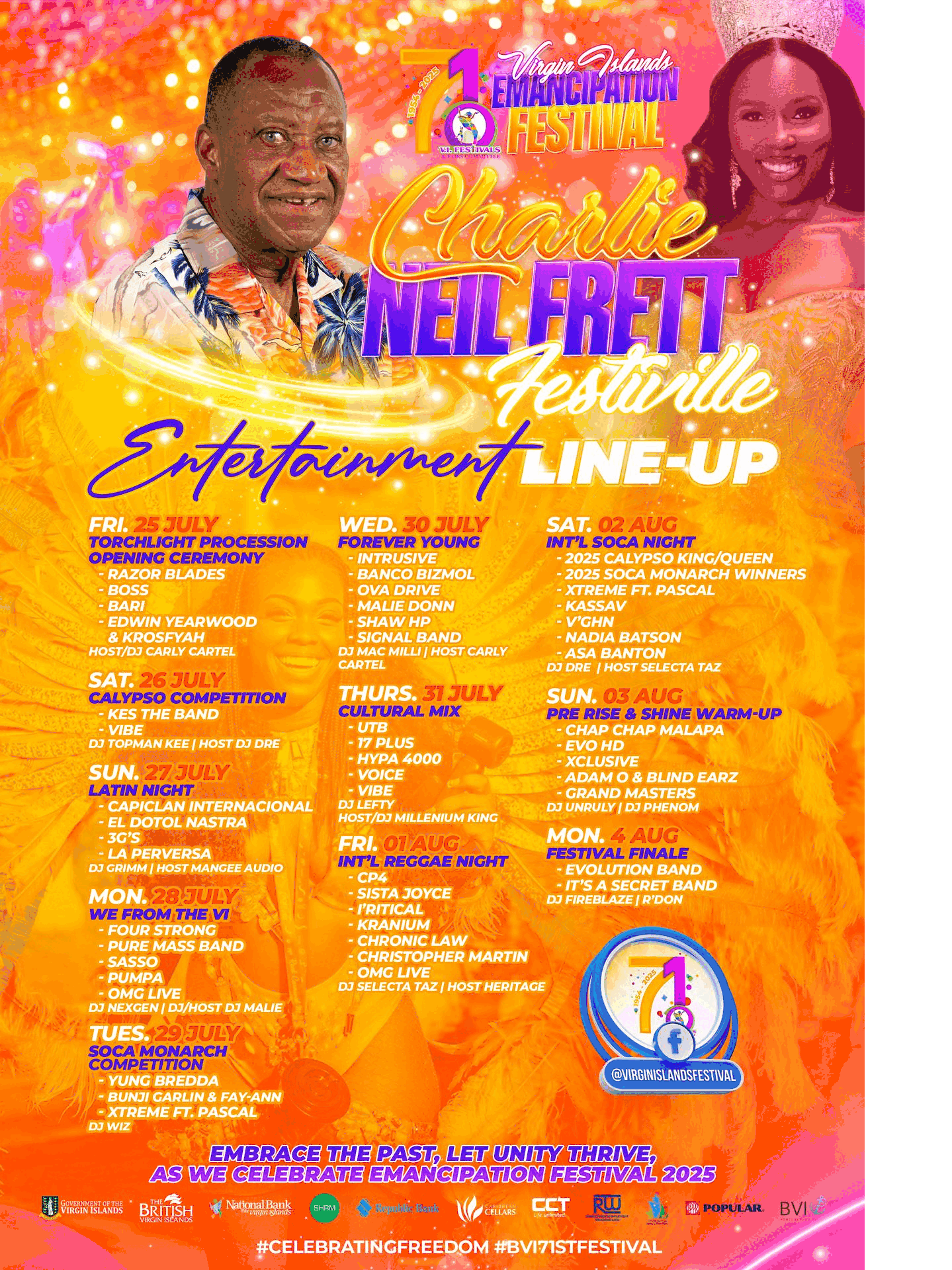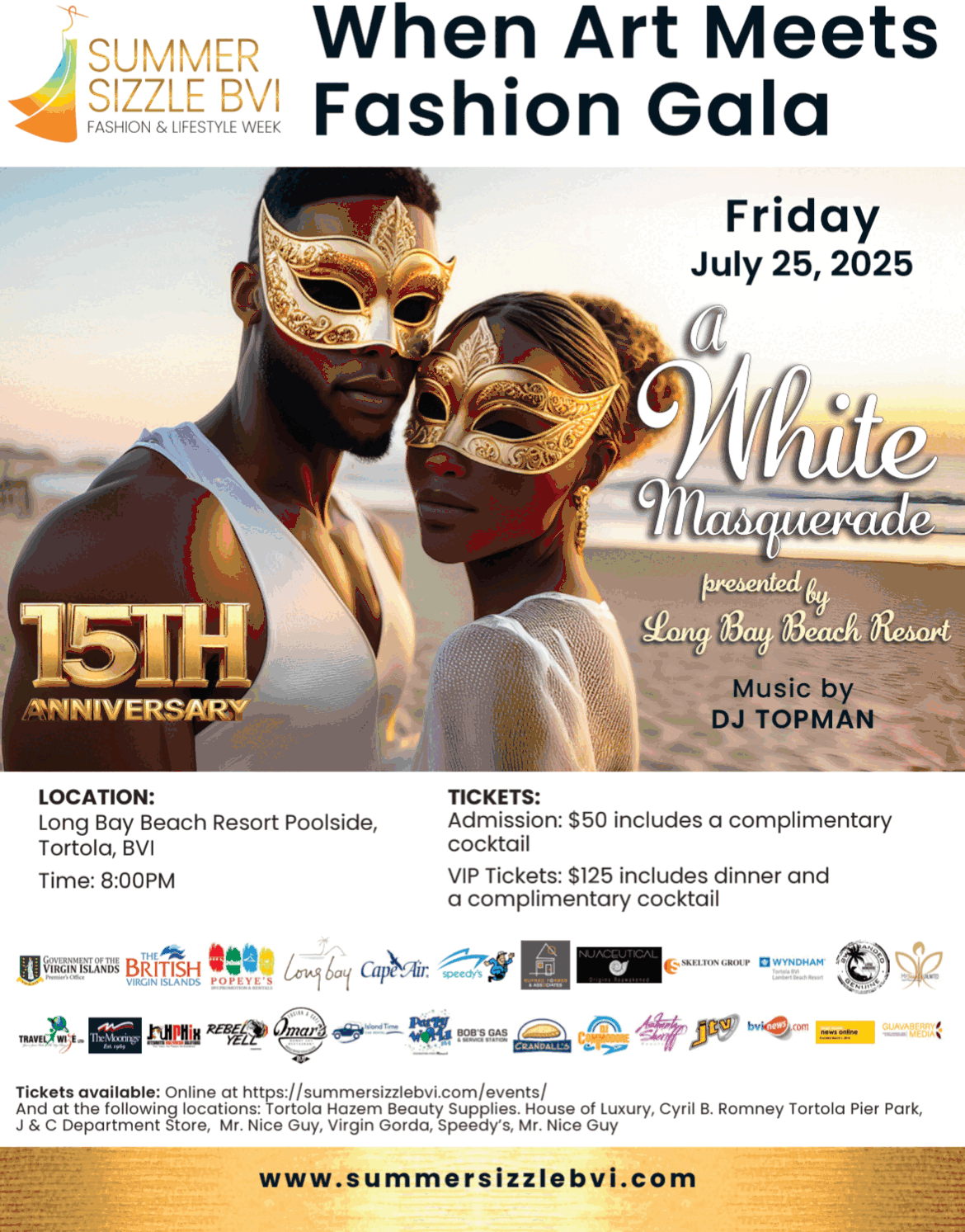West Indians: one people, one love
A day sail
This Old Beach Boy had the privilege, on a magnificent late morning in paradise, of sailing to Sandy Cay and Sandy Spit. These are two enchanting dots of combined rock, rugged vegetation, sand, and beach, in the Virgin Islands archipelago and Caribbean Sea. Close to a larger island called Jost Van Dyke, both the cay and spit- geographic terms- are two pieces of spectacular geography surrounded by pristine waters, coral reef, clear blue sea, and an enchanting backdrop of islands
Sandy Cay is just that: a tiny coral island separated from the seawater by a white sand beach that runs two thirds of the formation’s perimeter. The other third of Sandy Cay’s perimeter is a rocky patio and natural sea wall: a wonderful place to simply sit and dip the feet into the surrounding seas, or take photographs of a majestic background that would make a National Geographic photographer green with envy.
Sandy Spit is tinier still: a slither of sand and rock nearby Sandy Cay that could have been, as the name suggests, the spit of some god, congealed and hardened, to form a pristine and wonderful place of refuge for a weary human soul that needs to get away from troublesome humanity for a day.
A history lesson from a naturalized Virgin Islander
So your beachcomber sailed leisurely, in the company of a number of Virgin Islanders. One of these was an old school type. A naturalized Virgin Islander, named TOM WISE in this piece for anonymity, who has spent over half a century in the Virgin Islands: a lifetime practically.
As the catamaran chugged away from the dock, past Road Town, towards Jost Van Dyke, he was engaged in dialog with this graceful and wise character, from a much more enchanting yesteryear.
The West Indian gentleman stated to this avid listener that most of the young in these islands haven’t a clue about where they came from, or where they are headed. He highlighted a fact: three decades of affluence have taken away from the culture and values model of a rural and hardy yesteryear. As a result, a new generation has imbibed a selfishness and self-centeredness, probably adopted from a dominant US culture that exercises enormous influence over this territory and most of the Caribbean.
Hard Times
The wise man asserted that today’s Virgin Island’s entitlement culture, and the new and divisive politics of them versus us, would have been anathema to Virgin Islanders and residents of his own generation. When he was young, hardships spelled the opposite of what affluence appears to denote with today’s self centered value system.
No, when times were savage in these Lesser Antilles, the village truly came together, and every one cared for the other. Post slavery and colonial rule, West Indians in different islands were much more accepting and accommodating of their brothers and sisters from neighbouring islands, hence the high level of cross migration, and cross marriage, in the 1950s, 60s and 70s.
West Indian economic cycles
Another nugget, and piece of Caribbean economic history, the wise elder passed on to this eager student of Virgin Islands lore was this: Caribbean countries have always had their economic cycles: they go from periods of affluence to periods of struggle economically, and then back again. For example, in Tom’s childhood, and even before his time, Virgin Islanders frequently left these shores to work in places such as St. Thomas and the Dominican Republic; even Cuba. In St. Thomas especially, Virgin Islanders were given a 29 day stamp on their passports, after which they had to return home, before being able to return again.
Many of these very hardworking men worked at menial jobs. And life back home on Tortola and Virgin Gorda, was so hard, that many had to smuggle themselves into St. Thomas to work, in order to put bread on the family table. These Virgin Islanders would land by boat on a remote beach or natural mooring someplace, and then dash into the bushes to avoid detection. These illegal migrants, and those who overstayed, risked deportation and worse: but they had no choice if they were to provide for loved ones.
Today there has been a reverse in fortunes somewhat. Virgin Islanders and residents spend over one million dollars a week in the United States Virgin Islands. The British Virgin Islands, with an affluence that began in the early 1980s, is keeping many in that US territory in employment, and servicing the US territory’s economy.
And so it is with migrants in the British Virgin Islands returning to their homelands in St. Kitts, St. Vincent, St Lucia, Anguilla, Antigua, and so on. A subtle turn of that economic cycle, caused by Infrastructure improvements in many neighbouring islands, has improved economic conditions, and so much so that there are new employment opportunities in neighbouring countries. This is simply part of the economic roller coaster.
Social hypocrisy
Tom Wise also alluded to another matter. He spoke about the hypocrisy of those who criticized so called down islanders for sending money home.
Many of these were Virgin Islanders who depended on these same people, to provide the cheap labour to support their businesses, buy their frequently over priced goods, and rent their apartments. Today, a new set of migrants from the Pacific appear to be fulfilling that role, as many so called down islanders return home. One will see whether these new denizens of cheap labour are as beneficial to the bottom line of these Virgin Islands businesspeople as the slowly departing down islander. The Asian is a thriftier and much more frugal beast: enough said.
Others, who have been ‘CRITICIZED FOR DOING WELL,’ an allusion to a recent indirect jibe at Caribbean migrants by a certain commentator, are prospering, because they never had the option of entitlement many subscribe to today. Instead, they saved every dime, and spent it wisely, and are today reaping the good fruit of their labour, according to Tom.
Tom stated another fact. These VI businessmen and women, making these assertions, make most of their own purchases and buying decisions in the USA. The same persons who also complained that down islanders were sending too much money back to their homelands via money transfer, were the same ones taking money out the country to spend in the USA, on a weekly basis, hundreds of thousands of dollars, exponentially more money than the security officer, or construction worker, even teacher and doctor, sends to his or her family, in Lagos, Kingston, Basseterre, Roseau, Kingstown, or St Georges.
But isn’t that all part of how the so called global financial economy operates; and much to the benefit of these Lesser Antilles? There are greater inflows of cash into the Lesser Antilles than outflows: so what is the all fuss about hard working people sending money home to care for loved ones not able to migrate to live with their family member in the Virgin Islands?
One people: one love
Understand, that any objective observer from outside, will clearly conclude that WEST INDIANS, as they are known and named by people around the world, are a very homogeneous bunch, despite the economic disparities between various jurisdictions. And much more so than peoples from other regions, so that, from the north of the Caribbean Atlantic to the south, and the east to the west, there is one common theme, shared values, shared histories, shared cultures, and a unified social type. The West Indies could easily fit into the mould of nationhood: much more so than anywhere else on earth with disparate borders and jurisdictions.
And giving example, this is borne out by the fact that Virgin Islanders visiting their cousins in neighbouring countries will be unable, many a time, to tell the difference between themselves and their hosts. There is a common demographic, with African, Native Indian, Latino, European, Middle Eastern, and Asian cross currents. In fact, many Caribbean families on the various islands are linked with each other through multiple ties rooted in marriage, migration, and ancestry; or connected by religious, scholarly, professional, business, and social relations.
West Indians are of all hues, ethnicities, and races: a melting pot, a mixed dish, a delicious and delightful pilaf. Yes Brother Tom, despite these peculiarities, we are one people: one love!
To be continued
Connect with Dickson Igwe on Twitter and Facebook



.png)

.png)





.png)











.jpg)












3 Responses to “West Indians: one people, one love”